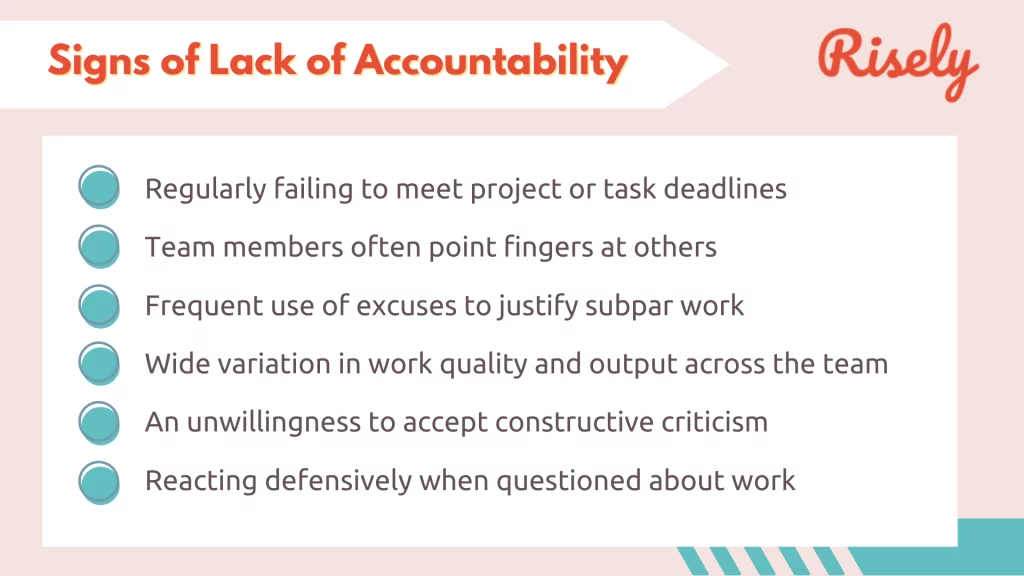4 Drawbacks of Lack of Accountability at Work and Ways to Overcome them
Ever feel like you’re carrying the weight of the team on your shoulders? You delegate tasks, set deadlines, yet some things just fall through the cracks. The culprit? A lack of accountability. This isn’t just a minor annoyance – it’s a productivity sinkhole that can drain morale, miss deadlines, and leave you feeling burnt out. But fear not, weary manager! This blog is your guide to conquering the accountability gap. We’ll explore the root causes of why employees might shirk responsibility, and equip you with 5 powerful strategies to cultivate a culture of accountability and transparency. Get ready to empower your team, boost productivity, and finally ditch the feeling of being the sole pillar holding everything up. Let’s dive in!Understanding Lack of Accountability in the Workplace
Creating a culture of accountability at work can motivate employees to take ownership and responsibility for their work. On the other hand, lack of accountability in the workplace can hinder overall productivity which can be frustrating or managers. Therefore, it is essential to understand its root causes and signs in order to take steps to enhance accountability.What is a Lack of Accountability?
Lack of accountability is a common problem in many workplaces and can adversely affect productivity, morale, and employee retention. It occurs when employees fail to take responsibility for their actions or do not follow through on commitments. Managers must understand that lack of accountability is not just an individual issue, but also a cultural one. To address this problem, managers can set clear expectations, provide regular feedback, and hold employees accountable for their performance. Creating a culture of accountability where everyone is responsible for their actions and decisions is also crucial. Effective communication and collaboration can further promote accountability in the workplace. By implementing these strategies, managers can improve team accountability and create a more productive and positive work environment.Other Interesting Reads
Signs of Lack of Accountability in the Workplace
Lack of accountability in the workplace can have serious negative consequences, including decreased productivity, low morale, and a toxic work environment. Examples of lack of accountability include blaming others for mistakes, not following through on commitments, and avoiding responsibility. Some examples of lack of accountability in the workplace include:- A team member repeatedly misses deadlines or fails to deliver on promised work, yet there are no consequences for their behavior.
- Managers fail to take responsibility for their mistakes or poor performance and instead blame their subordinates or external factors.
- Employees routinely engage in office gossip or spread rumors, and no one is held accountable for their actions.
- A team member consistently arrives late to meetings or fails to show up without notice, disrupting team productivity.
- A department fails to achieve its goals, but no one takes responsibility or is held accountable for the outcome.
- A colleague takes credit for someone else’s work, and no one confronts them or addresses the issue.
- An employee engages in unethical behavior, such as lying, cheating, or stealing, and no action is taken to hold them accountable for their actions.
- A team member fails to follow established procedures or guidelines, leading to mistakes, delays, or other problems, yet there are no repercussions for their behavior.
- A manager fails to provide adequate training or support to their team members, resulting in poor performance or subpar results, yet no one holds them accountable for their leadership.

Causes of Lack of Accountability
Managers’ lack of accountability in the workplace can be a common issue. It can stem from various factors such as unclear expectations, poor communication, lack of consequences, and fear of failure or reprisals. Therefore, managers must effectively address the root cause of the lack of accountability. Some common reasons why you might be facing a lack of accountability at work are:- Poor Communication: When communication is poor or inconsistent, it can lead to misunderstandings, missed deadlines, and incomplete work. Without clear expectations and feedback, team members may not understand what is expected of them, leading to a lack of accountability.
- Fear of Conflict: Many people are uncomfortable with conflict and will avoid confrontation at all costs, even when holding others accountable is necessary. It can lead to a culture of avoidance, where people hesitate to call out others’ mistakes or poor performance.
- Lack of Consequences: When there are no consequences for poor performance or missed deadlines, it can lead to a lack of accountability. If team members know they won’t face any repercussions, they may not feel motivated to perform at their best.
- Poor Leadership: A lack of accountability can also stem from poor leadership. When managers or leaders fail to set clear expectations, provide adequate training or support, or lead by example, it can create a culture of low accountability. Additionally, when leaders themselves are not held accountable, it can send a message to team members that accountability is not valued or expected.
- Silo Mentality: When departments or teams operate in silos, it can lead to a lack of accountability. Without collaboration or communication across departments, team members may feel less responsible for contributing to the larger organization’s goals. It can create an environment where people are more concerned with their work than how it fits into the bigger picture.
What are the Consequences of Lack of Accountability?
- Reduced productivity: A lack of accountability in the workplace culture hampers team performance. As individual team members are not held responsible for tasks, there are frequent delays and missed deadlines. Overall, such attitude from some team members can create a culture lacking accountability, leading to long-term issues that inhibit the team’s growth prospects.
- Falling performance standards: When accountability is out of the equation in a workplace setting, team members are less likely to put in their best efforts, as even bare minimum work can get them through. As a result, the overall quality of the output generated by the team suffers. It can further impact their reputation and credibility.
- Unhealthy team dynamics: A lack of accountability in the workplace worsens the team dynamics and ensures collaboration is very hard. When some team members shed every responsibility and continue to remain unimpacted, it puts an uneven burden on the rest of the team, as others are constantly handling the extra workload and the associated blame game as well.
- Decreased trust and morale: The lack of accountability in the workplace hurts the trust between team managers and members. If the unaccountable behavior stems from the manager, it further causes issues and sets harmful precedents in the team. As a result, when team members are bogged down by constant pressure in an unhealthy environment, their enthusiasm at work falls.
How to Deal with Lack of Accountability in the Workplace?
As a manager, it’s your responsibility to ensure everyone on the team is accountable for their actions. Here are five tips to help you deal with a lack of accountability in the workplace: Firstly, the expectations must be clearly communicated to employees and restated regularly. Secondly, hold individuals accountable for their actions and follow through on consequences. Encourage a culture of transparency and open communication among team members so they can take responsibility for their actions without fear of judgment or retaliation. Provide regular feedback and coaching sessions to help employees improve their skills as well as performance. Lastly, lead by setting an example and holding yourself accountable for your actions as a manager. By following these steps, you can create an environment where accountability is valued and expected from every team member.Set Clear Expectations and Goals
One of the critical ways for managers to deal with a lack of accountability in the workplace is to set clear expectations and goals. Managers can establish a culture of accountability by clearly communicating what is expected of team members. This means that employees understand what they need to do and are likelier to take ownership of their work and responsibilities. Managers should regularly check in with their employees to identify gaps in accountability and address them promptly. Rewarding accountability can also be an effective way to encourage employees to take ownership of their work. For example, recognizing employees who consistently demonstrate accountability can help to reinforce positive behavior.Provide Continuous Feedback and Coaching
An effective way for managers to address the lack of accountability in the workplace is by providing continuous feedback and coaching to their employees. It can help employees understand the importance of being accountable and give them the tools they need to improve their performance. In addition to coaching, managers should clearly communicate expectations and hold employees responsible for their actions. Consequences for lack of accountability, such as performance evaluations or job reassignments, should also be established. Creating a transparency and open communication culture can also encourage workplace accountability. However, managers must lead by example and hold themselves accountable for their actions. By demonstrating accountability in their work, managers can set a positive example for their team and foster a culture of responsibility throughout the organization.Hold Employees Accountable for Their Actions
As a manager, it’s important to deal with a lack of accountability in the workplace proactively. One essential tip is to hold employees accountable for their actions. It involves setting clear expectations and communicating them effectively to your team. You should also establish consequences for not meeting those expectations and ensure employees are held responsible for their actions. Ultimately, creating a workplace accountability culture can lead to increased productivity and success.Recognize and Reward Accountable Behavior
Another valuable tip is to recognize and reward responsible behavior when dealing with a lack of accountability in the workplace. It helps to foster a culture of responsibility and ownership within the workplace. Managers can help employees improve their accountability skills by providing constructive feedback and coaching. Ultimately, by taking these steps, managers can help to reduce missed deadlines, improve morale, and increase productivity in the workplace. Employee recognition can be tricky, here’s how to get it right in a hybrid workplace: Employee Recognition In A Hybrid WorkplaceFoster a Culture of Accountability and Transparency
One of the most effective ways for managers to deal with a lack of accountability in the workplace is to foster a culture of accountability and transparency. It involves several key steps, including clearly communicating expectations and consequences for lack of accountability, leading by example and holding oneself accountable, providing regular feedback, coaching, and training to employees, and promoting transparency in communication and decision-making. By emphasizing these principles within the workplace, managers can help promote a sense of ownership among employees while ensuring everyone understands their responsibilities. Over time, this can lead to increased productivity and morale as well as a stronger sense of teamwork and collaboration. But ultimately, it’s up to managers to set the tone for accountability within their teams and create a positive workplace environment that encourages responsibility and integrity at all levels.Become a Proactive Manager
Fighting can be pretty tricky once the menace of unaccountability has set its foot in a team. But being a proactive manager who takes challenges head-on and allows detours from conventional methods can be a solid approach.The essential lies in helping team members visualize the big picture. Remind them their role is not just about the pending task on their list. Instead, their contribution adds to making the vision of the company real. In addition creating a system of checks and balances that can include a mix of performance reviews, one-on-one meetings, and feedback sessions can help. When team members feel their efforts are seen, they are more willing to contribute.
Conclusion
Cultivating a culture of accountability isn’t about micromanaging or finger-pointing. It’s about empowering your team to take ownership, celebrate successes, and learn from setbacks together. Imagine a team where everyone feels supported, valued, and responsible for achieving shared goals. That’s the magic that happens when accountability takes root. So, take the first step today! Implement the tips outlined in this blog, foster open communication, and watch your team transform into a high-performing unit. Remember, a culture of accountability is a journey, not a destination. But with dedication and these strategies as your guide, you’ll be well on your way to building a dream team that thrives on ownership, transparency, and success. Now go forth and lead with purpose!Learn the art of effective constructive feedback with the help of a free toolkit.
Constructive feedback helps managers set expectations and review progress with team members. Get started today to build accountability.
Other Related Blogs
8 Steps To Become A Results-Oriented Leader (with Examples)
8 Steps To Become A Results-Oriented Leader (with Examples) As a leader, it’s essential to be result-oriented. It refers to focusing on what your team can achieve and not just…
15 Examples of Accountability in the Workplace to Improve Ownership in Teams
15 Examples of Accountability in the Workplace to Improve Ownership in Teams You must have worked with or heard of someone who often blames other team members for their inability…
Understanding The Importance Of Accountability In Leadership With 3 Real-Life Examples
Understanding The Importance Of Accountability In Leadership With 3 Real-Life Examples What makes a great leader? Is it their charisma, intelligence, or ability to inspire others? While these qualities are…
From secrets to success: Embracing transparency in the workplace
From secrets to success: Embracing transparency in the workplace Are you curious how transparency can transform your workplace and boost productivity, engagement, and employee trust? Do you want to learn…


